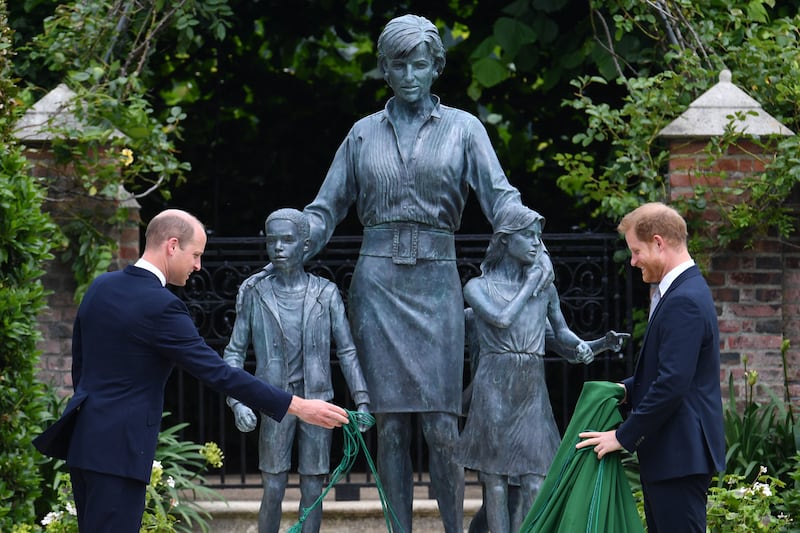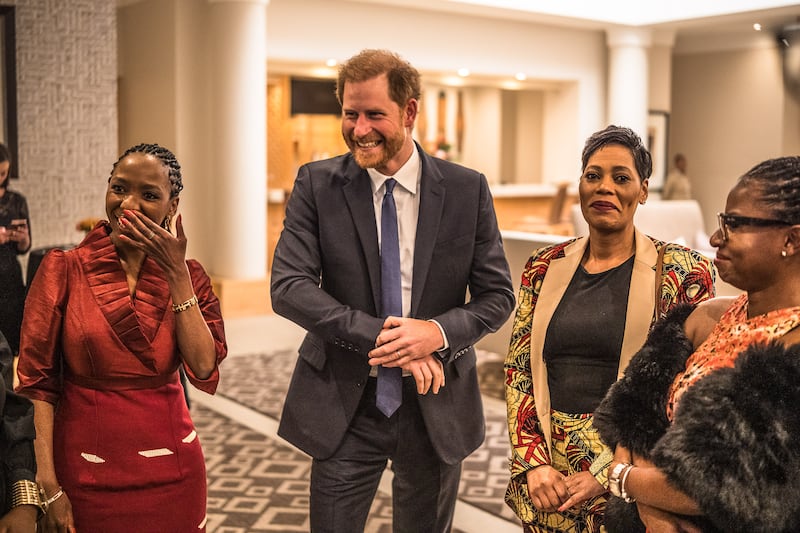To have one problematic African charity might be considered a misfortune, but being associated with two? That could start to look like carelessness for Prince Harry.
But this is the unenviable situation in which the prince finds himself, for although royal news feeds this week have been dominated by news that he had quit his Lesotho-based AIDS charity Sentebale amid a poisonous race-fueled dispute with its chairwoman, Sophie Chandauka, Harry is also the public face of another hugely controversial and powerful African charity: African Parks.
This conservation organization, of which Harry was once president and is now a senior board member, manages and polices vast swathes of African wilderness, comprising 22 national parks across 12 African countries. Its stated aims are to conserve wildlife and support local communities—noble causes close to Harry’s heart.
However, critics say African Parks operates a “fortress” conservation model on “colonial” lines, and park rangers in its employ have been accused of vile abuses of the enormous power they wield in the Odzala-Kokoua National Park in the Republic of Congo.
In 2023, Survival International, a human rights organization focused on advocating for tribal people, produced documented allegations of beatings, rapes, and torture of indigenous Baka people in Odzala-Kokoua by rangers employed by African Parks.
The allegations led Survival International’s campaigns director, Fiore Longo, to call on Harry to step down as a director of the charity, saying, “He needs to distance himself from an organization that is complicit in evictions and the heinous abuse of indigenous people.”
In response, Harry’s aides briefed that he had pledged to use his position to escalate the issue to senior ranks within African Parks. And in January 2024, African Parks announced it was launching an investigation. Despite stating that addressing the allegations was its “highest priority,” it has not published the results of the investigation—nor said if it ever will. African Parks did not respond to a request for comment.
In the absence of comment from African Parks, Survival International has remained vocal. In a November 2023 statement, it said the violence was ongoing.
The organization reported “intimidation of Baka people by African Parks guards just before the investigation began on the ground” and claimed that investigators from a U.K. law firm who arrived to interview victims were in “an African Parks car, and accompanied by a Congolese government official”—which, they said, had “a chilling effect on the Baka’s willingness to speak openly.”
Survival International also alleged “shocking reports of further beatings of a group of Baka women and children by African Parks rangers,” resulting in one woman losing her unborn child. This reportedly took place while the investigation was still ongoing—suggesting, they said, that guards still believed they could act with impunity.
Now, in the light of the spectacular falling out with Sentebale—which Harry co-founded in 2006 to honor his late mother, Princess Diana—the issue of abuse and governance at African Parks may be something the prince wishes to reconsider.

The controversy surrounding African Parks is part of a broader pattern of human rights concerns associated with conservation in Africa. Critics say that indigenous communities are too often evicted, marginalized, or abused in the name of environmental protection.
In its November statement, Survival International said African Parks was refusing to address what it sees as the root cause of the abuse: “a racist and colonial fortress conservation model.”
Such criticism is likely to be particularly painful for Harry, who has made much of how he believes his wife, Meghan Markle, was the subject of prejudice due to her non-white heritage when they were working royals.
And the allegations of racism made by Sentebale chairwoman Sophie Chandauka—a Zimbabwe-born lawyer, may trouble Harry and his advisers most, should they now choose to reflect on his global charitable involvement.
Chandauka said, in criticism directed at Harry and other trustees who have now quit Sentebale: “Beneath all the victim narrative and fiction that has been syndicated to the press is the story of a woman who dared to blow the whistle about issues of poor governance, weak executive management, abuse of power, bullying, harassment, misogyny, misogynoir [misogyny directed at Black women]—and the cover-up that ensued. I could be anyone. I just happen to be an educated woman who understands that the law will guide and protect me.”

Sentebale, which means “forget-me-not” in the local language, traditionally operated in Lesotho and Botswana, supporting vulnerable children affected by HIV/AIDS. It was co-founded in 2006 by Prince Harry and Prince Seeiso of Lesotho—both of whom lost their mothers at a young age and formed a bond as a result. For Harry, Sentebale represented a vital connection to his humanitarian work following his departure from official royal duties.
A spokesperson for Prince Harry directed The Daily Beast to the January 2024 African Parks statement. African Parks did not respond to a request for comment. Survival International said there was no update on its November 2024 statement.
Critics argue that Harry’s continued association with the organization undermines his humanitarian commitments—especially in light of his previous accusations of prejudice within the royal family during the Oprah Winfrey interview and his memoir.
Sympathetic supporters of Harry will argue that the challenges he faces by being involved with Sentebale and African Parks highlight the complexities and risks associated with philanthropic work—particularly for high-profile individuals.
But there is also an argument to be made that the controversy surrounding Harry’s charitable affiliations suggests that operating without the institutional support of the royal household—such as experienced private secretaries and press officers to vet and tightly control messaging—may have contributed to these difficulties.
Demonstrating a commitment to ethical practices and human rights has undoubtedly cemented his credibility as a global humanitarian. But difficult decisions about his roles within certain organizations, and the need to advocate for systemic changes within the philanthropic sector, is something that the fiasco at Sentebale should bring into tight focus.
The controversies serve as a stark reminder of the delicate balance required in charitable work—especially when it intersects with complex issues of power and race. For public figures like Prince Harry, this requires not just an unwavering commitment to the principles they seek to promote, but an attenuation to, and a readiness to act upon, the political signals transmitted across this undulating terrain.







